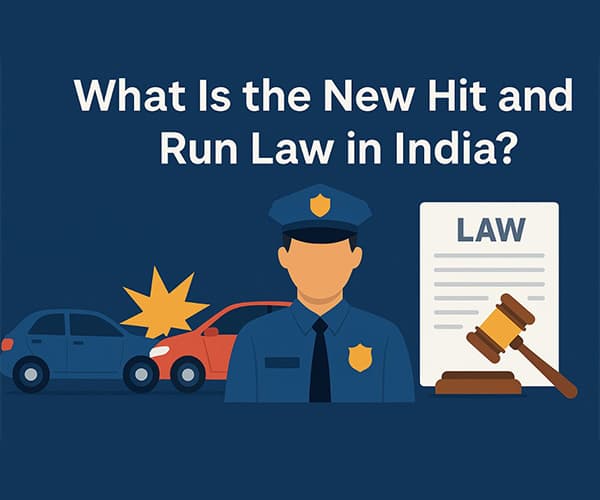What Is the New Hit and Run Law in India? Full Legal Guide

In 2024, India witnessed widespread protests by truck and bus drivers after the government introduced a new hit and run law in India. This law, part of the Bharatiya Nyaya Sanhita (BNS), replaced provisions of the Indian Penal Code (IPC) and brought stricter penalties for offenders. But what exactly does this law mean for drivers, victims, and the justice system? This comprehensive guide by Vakeel Saab explains it all.
The Bharatiya Nyaya Sanhita hit and run law came into force in 2024, marking a major change in India’s criminal justice system. Previously, hit-and-run cases were handled under the IPC. Now, under Section 106 BNS, harsher punishments have been introduced, especially when the driver flees without informing authorities or helping victims. This blog explains the new hit and run law 2024 India, penalties, reforms, and the role of Criminal Lawyers in India in guiding you through such cases.
Section 106 BNS – Hit and Run Law Explained
The new provision under Section 106 of the Bharatiya Nyaya Sanhita deals with motor vehicle accidents, rash driving, and leaving the accident scene. It makes fleeing the site of an accident without reporting or assisting the injured a serious criminal offence.
- Rash or negligent driving causing death: Punishable with up to 5 years imprisonment and fine.
- Fleeing without reporting/helping: Punishable with up to 10 years imprisonment and fine.
This marks a big shift compared to the IPC, where punishment was less severe, typically up to 2 years imprisonment.
Key Changes from IPC to BNS
- Stricter Punishment: BNS prescribes higher imprisonment terms and fines compared to the IPC.
- Greater Accountability: Drivers are legally bound to stop, report, and assist accident victims.
- Victim-Centric Approach: Law ensures better protection and compensation for victims.
Hit and Run Penalties in India – New Law
The BNS 2023 hit and run punishment includes:
- Imprisonment up to 5 years for rash/negligent driving causing death.
- Imprisonment up to 10 years if the driver flees without reporting the accident.
- Hefty fines depending on the case circumstances.
Hit and Run Protests Across India
The announcement of the new law led to hit-and-run law protests in India, especially by truck and commercial vehicle drivers. Many argued the punishments were excessive, leading to fear and livelihood concerns. Reports of truck drivers protesting the hit and run law in several states made headlines in early 2024. Despite protests, the government emphasized accountability and victim rights as core reasons for reform.
Victim Compensation and Accountability
A critical aspect of the hit and run law accountability in India is compensation for victims. The government has schemes for hit and run victim compensation law, ensuring that families of victims receive financial relief. Courts also take into account rash driving, negligence, and whether the driver made any effort to assist the injured party.
When to Consult a Criminal Lawyer
Whether you are an accused driver or a victim’s family, navigating hit and run cases is complex. Engaging a Criminal Lawyer in Delhi or anywhere in India through Vakeel Saab ensures:
- Proper defense strategies in case of wrongful implication.
- Filing for bail applications and anticipatory bail under new provisions.
- Assistance with victim compensation claims.
- Representation in trial courts and appeals.
Frequently Asked Questions (FAQ)
What is Section 106 BNS?
Section 106 of the BNS deals with hit and run offences, prescribing stricter punishments if the driver flees without helping victims.
What is the punishment under the new hit and run law?
Up to 5 years imprisonment for rash driving causing death, and up to 10 years if the driver escapes without reporting.
Why are truck drivers protesting the law?
Truck and bus drivers fear that harsher penalties could put their livelihood at risk and increase harassment, leading to truck drivers protest hit and run law nationwide.
How is the new law different from IPC?
The IPC had lighter penalties (2 years). The BNS has stricter punishments (up to 10 years), focusing on accountability and victim support.
Can victims claim compensation?
Yes, families of victims are entitled to compensation under government schemes and court orders for hit and run victim compensation law.
If you are involved in a hit and run case — whether as an accused or a victim’s family — don’t face it alone. Vakeel Saab connects you with top Criminal Lawyers in India who specialize in road accident and criminal law cases. Our criminal lawyer consultation service helps you understand the new provisions, protect your rights, and take the right legal steps. Book your consultation today and let Vakeel Saab guide you through India’s evolving legal landscape.
Related Articles
The Importance of Consulting a Property Lawyer for Real Estate Issues
Blog
How to File a POCSO Complaint in India: Step-by-Step Legal Process
Blog
What punishments does the law give for giving, taking, or asking for dowry?
Blog
Reasons for the Increasing Divorce Rates in India
Blog
What is a Special Leave Petition? Meaning, Features, Process & & Who Can File?
Blog
What Is the Difference Between Mutual Divorce and Contested Divorce?
Blog